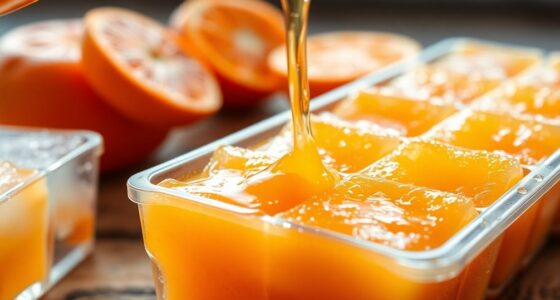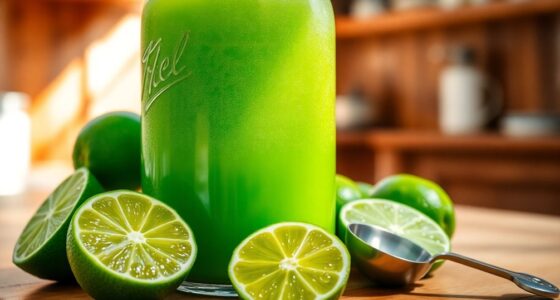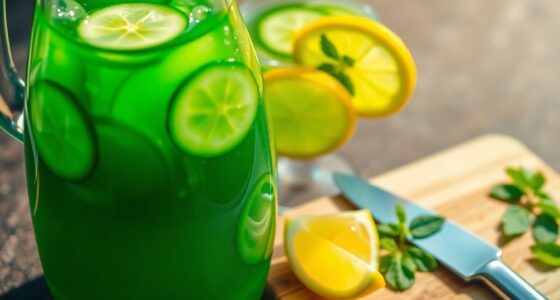Lemon juice cooks shrimp by denaturing its proteins through acidity. As you marinate the shrimp in lemon juice, the proteins unravel and reform, making the shrimp opaque and firmer in just 30 minutes to an hour. This change mimics the effects of cooking with heat, creating a fresh and flavorful dish. To enhance taste, you can mix lemon juice with other acidic ingredients. There's more to discover about this delicious process waiting for you!
Key Takeaways
- Lemon juice acts as an acidic marinade, denaturing proteins in shrimp, which changes its texture and color, similar to cooking with heat.
- The citric acid in lemon juice causes proteins to unravel and reform, making shrimp opaque and firmer after marination.
- Marination typically takes 30 minutes to an hour, depending on shrimp size and lemon juice acidity.
- While lemon juice kills some surface bacteria, it does not eliminate all pathogens, so using fresh, high-quality shrimp is essential.
- Combining lemon juice with other acids, like lime or vinegar, enhances flavor and texture, improving the overall dish.

Lemon juice is a powerful tool in the kitchen, transforming shrimp into a delicious dish without the need for heat. When you use lemon juice as an acidic marinade, you're starting a process that denatures proteins in the shrimp, changing its texture and color much like cooking with heat would. This unique method allows you to enjoy shrimp that's both fresh and flavorful, making it an excellent choice for ceviche and other raw seafood dishes.
When you soak raw shrimp in lemon juice, the citric acid begins to work its magic. The proteins in the shrimp start to unravel and reform, which is why you'll notice the shrimp turning opaque and firmer after marinating. Typically, this process takes about 30 minutes to an hour, depending on the size of the shrimp and the acidity of the juice. If you're working with high-quality shrimp, you'll be amazed at how the marinade enhances the flavor while giving the shrimp a cooked appearance.
While lemon juice does effectively kill some surface bacteria, it's crucial to remember that it doesn't eliminate all pathogens. That's why using fresh, high-quality shrimp is essential. You want to ensure that your seafood is safe to eat, especially when you're serving it raw or lightly marinated. The quality of the shrimp can make all the difference in the final dish, so be sure to choose shrimp that looks bright and smells fresh.
For optimal flavor, consider combining lemon juice with other acidic ingredients, like lime juice or even vinegar. This not only enhances the taste but can also improve the effectiveness of the marinade. The acidity can penetrate the shrimp more effectively, making for an even better texture and flavor profile. You'll find that a well-balanced marinade can elevate your dish, making it truly memorable.
When you're ready to serve, you'll notice the shrimp has taken on an appealing opaque hue, signaling that it's been "cooked" by the marinade. You can serve it as is or incorporate it into salads and tacos, allowing the vibrant flavors to shine.
The beauty of using lemon juice lies in its versatility; it can complement a variety of ingredients, making your dish exciting and fresh.
Frequently Asked Questions
How Does Lime Juice Cook Raw Shrimp?
When you marinate raw shrimp in lime juice, the acid denatures the proteins, causing them to firm up and turn opaque. This process mimics cooking, giving you that desirable texture.
For the best results, use freshly squeezed lime juice, and let the shrimp marinate for 15 minutes to an hour, depending on their size.
Just be careful not to over-marinate, or your shrimp might end up rubbery from too much acid exposure.
Why Do You Put Lemon Juice in Shrimp?
You add lemon juice to shrimp for flavor, for food safety, and for texture. The bright acidity enhances the shrimp's natural taste, making each bite refreshing.
Plus, lemon juice helps kill harmful bacteria, reducing the risk of foodborne illness. As the citric acid interacts with the shrimp, it firms up the meat and gives it a pleasing, opaque appearance.
Is Bacteria Killed in Ceviche?
When you make ceviche, you might wonder if the bacteria in raw seafood are killed.
Lemon juice can lower pH, which helps kill some bacteria, but it doesn't eliminate all pathogens. The effectiveness depends on how acidic the juice is and how long you marinate the shrimp.
To be safe, stick with high-quality, fresh shrimp and marinate for at least 30 minutes.
Pregnant women and those with weakened immune systems should avoid ceviche altogether.
How Does Lemon Juice Cook Fish?
Lemon juice cooks fish by denaturing the proteins, changing their structure and creating a firmer, opaque texture similar to heat. This process not only transforms the fish’s texture but also infuses it with a refreshing flavor that complements its natural taste. Additionally, lemon juice is effective beyond cooking; it plays a crucial role in lemon juice and fish odor removal, helping to neutralize any unpleasant smells. As a result, dishes prepared with lemon can be both delicious and aromatic, enhancing the overall dining experience.
You can marinate fish for about 20 minutes to achieve the best results without making it rubbery. The acidic nature of lemon juice also helps kill some harmful bacteria, enhancing safety.
However, using fresh, high-quality fish is essential since lemon juice doesn't eliminate all pathogens. Different fish types may need varying marination times.
Conclusion
As you squeeze that fresh lemon juice over your shrimp, you might not realize the magic happening right before your eyes. The citric acid begins its work, transforming translucent flesh into a vibrant, opaque delight. But wait—what if you leave it too long? The sharp tang could overpower the delicate flavor, leaving you with an unexpected twist. In cooking, like life, timing is everything. So, will you take the plunge or let the moment slip away?
Cindy thoroughly researches juicing trends, techniques, and recipes to provide readers with practical advice and inspiration. Her writing style is accessible, engaging, and designed to make complex concepts easy to understand. Cindy’s dedication to promoting the advantages of juicing shines through her work, empowering readers to make positive changes in their lives through the simple act of juicing.











